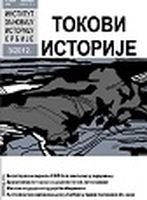Између старих и нових изазова – Бугарска у политици Краљевине СХС 1926. године
Between Old And New Challenges: Kingdom Of Serbs, Croats And Slovenians Policy Towards Bulgaria In 1926
Author(s): Ivan RistićSubject(s): History
Published by: Institut za noviju istoriju Srbije
Keywords: Kingdom of Serbs; Croats and Slovenians; Bulgaria; the Balkans; international relations; foreign policy
Summary/Abstract: After World War I relations between Bulgaria and the Kingdom of Serbs, Croats and Slovenians were burdened by inherited problems, such as the Macedonian Question on one hand and, on the other, problems connected with the Peace Treaty Commission. In the second half of 1920s, an external factor – the activity of fascist Italy in the Balkans against the Kingdom of Serbs, Croats and Slovenians – became crucial for formulating the policy of Belgrade towards Bulgaria. We can say that the year 1926 was a turning point in relations because at the end of 1925 and beginning of 1926 changes on the international and domestic plan took place (Locarno Treaties in October 1925 and the new government in Bulgaria in January 1926). This year was turbulent, dynamic and full of conflicts in the YugoslavBulgarian relations. The following issues were on the agenda: international loan(which Bulgaria requested from the international financial institutions) needed for a large number of refugees who lived in Bulgaria; an arbitration agreement that the Kingdom of Serbs, Croats and Slovenians offered to Bulgaria, which was in the „spirit of Locarno“; the terrorist attackscarried out by the Macedonian organization (IMRO) from Bulgarian territory on the territories of neighboring countries. These tensions resulted not only in a stalemate in relations, but also the beginning of a new phase – a „battle“ fought by Yugoslav diplomacy to prevent Italian influence in Bulgaria. During the second half of 1920s many attempts were made to create conditions to improve relations, however many obstacles remained. Therefore, the analysis of Yugoslav policy toward Bulgaria in 1926 is important for a thorough understanding of the key processes and events that followed.
Journal: Tokovi istorije
- Issue Year: 2013
- Issue No: 2
- Page Range: 75-96
- Page Count: 22
- Language: Serbian

